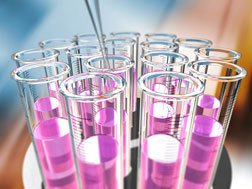
Biotechnology in the 21st Century 2009
Distributed by Films Media Group, PO Box 2053, Princeton, New Jersey 08543-2053; 800-257-5126
Produced by Tracey D. Sims
Directed by Amy S. Weber
DVD, color, 24-28 min. each
College - Adult
Biotechnology, Biology, Genetics, Health Sciences, Science
Date Entered: 11/03/2009
Reviewed by Ronald Saskowski Jr., ASRC Management Services, Atlanta, GABiotechnology in the 21st Century is a series of four films that delve into the science of biotechnology and how it is currently being used in everyday facets of our lives from food production to disease treatment.
Biotechnology on the Farm and in the Factory: Agricultural and Industrial Applications explores how biotechnology has been and is currently being used in food production. Growing populations demand more food but space and resources are limited. The genetic modification of food allows for more robust and longer lasting harvests. Food products in developing countries can be modified so that they will provide more nutritional bang for the buck. Industrial uses, such as gasoline alternatives, chemicals and textiles are also examined in this feature. Interesting research and development is going on in the area of fuel alternatives to help us get away from fossil fuel dependence.
Bioinformatics, Genomics and Proteomics: Getting the Big Picture focuses on how the study of genomics and proteomics can help to one day find a way to explain, manage and treat diseases. The Human Genome Project is discussed and used as a spring board for future research. This DVD tends toward the more technical side of biotechnology but weaves in less technical points.
Biotechnology and Your Health: Pharmaceutical Applications discusses how biotechnology is being used to treat human diseases particularly cancer and diabetes. A nice history of penicillin is provided along with how certain types of e coli are used in the development of pharmaceuticals. Cancer and diabetes are talked about extensively in this DVD. Stem cell research for the treatment of specific issues like spinal cord injury is touched on briefly but certainly opens up the floor for more in depth discussion.
The Ethics of Biotechnology is the final installment in the series and explores the ethical and moral aspects of biotechnology including cloning and stem cell research. Animal cloning is examined in depth and human cloning is briefly explored. Although these topics can be extremely volatile, this piece is exceptionally well balanced and does not force one point of view over another. This film lends itself towards further discussion and debate.
Each DVD contains commentary from a diverse panel of people from the public and private sector. This combination provides a good mix of viewpoints. Each person is clearly identified throughout the DVDs making it easy for the viewer to keep track of who is speaking.
Use of special 3-D graphics and images of DNA and cells enhance an already visually pleasing production. Definitions of key terms throughout the DVDs are shown on the screen for a comfortable amount of time allowing the viewer to read at a good pace. The music used in all the films suits the subject matter.
This series is recommended for the intended audience only. Some of the subject matter by its very nature is somewhat technical and needs the right audience to be appreciated.
College and university libraries with programs in biotechnology, biology, health sciences and science will benefit from having this series in their collection.